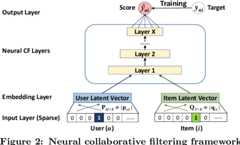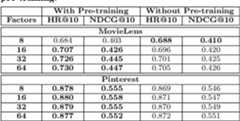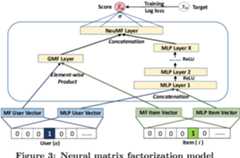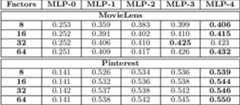DOI:10.1145/3038912.3052569 - Corpus ID: 13907106
Neural Collaborative Filtering
@article{He2017NeuralCF, title={Neural Collaborative Filtering}, author={Xiangnan He and Lizi Liao and Hanwang Zhang and Liqiang Nie and Xia Hu and Tat-Seng Chua}, journal={Proceedings of the 26th International Conference on World Wide Web}, year={2017}, url={https://api.semanticscholar.org/CorpusID:13907106}}- Xiangnan HeLizi LiaoTat-Seng Chua
- Published inThe Web Conference3 April 2017
- Computer Science
This work strives to develop techniques based on neural networks to tackle the key problem in recommendation --- collaborative filtering --- on the basis of implicit feedback, and presents a general framework named NCF, short for Neural network-based Collaborative Filtering.
6,400 Citations
Figures and Tables from this paper
Topics
Neural Collaborative Filtering (opens in a new tab)User-item Interaction Function (opens in a new tab)Generalized Matrix Factorization (opens in a new tab)Neural Matrix Factorization (opens in a new tab)Recommendation Performance (opens in a new tab)User-item Interaction Data (opens in a new tab)Element-wise Alternating Least Squares (opens in a new tab)Implicit Feedback (opens in a new tab)Collaborative Denoising Autoencoder (opens in a new tab)ItemPop (opens in a new tab)
6,400 Citations
Recommended System: Attentive Neural Collaborative Filtering
- Yanli GuoZhongmin Yan
- 2020
Computer Science
This work strives to develop techniques based on neural networks to tackle the key problem in recommendation — collaborative filtering — on the basis of implicit feedback, and presents a general method named ANCF(Attention Neural network Collaborative Filtering).
Neural Collaborative Filtering with Pairwise Learning for Implicit Feedback Data
- 2024
Computer Science
2024 IEEE 3rd International Conference on Data…
This paper presents a framework NCF-PL, short for neural collaborative filtering with pairwise learning to model the pairwise preference of the items for the users using implicit feedback data, and uses dot product to model user-item interaction, which generalizes matrix factorization under the NCF-PL framework.
Collaborative Filtering: Graph Neural Network with Attention
- Yanli GuoZhongmin Yan
- 2020
Computer Science
This work proposes a general method called “Graph Neural Network with Attention” (GNNA), which captures CF signals based on neural networks and uses high-order connectivity to obtain neglected interactive information, thereby improving the embedding of users and items and proved the rationality and effectiveness of GNNA.
Collaborative Autoencoder for Recommender Systems
- Qibing LiXiaolin ZhengXinyue Wu
- 2017
Computer Science
A generic recommender framework called Neural Collaborative Autoencoder (NCAE) is presented to perform collaborative filtering, which works well for both explicit feedback and implicit feedback and can effectively capture the relationship between interactions via a non-linear matrix factorization process.
A Group Recommendation Approach Based on Neural Network Collaborative Filtering
The experimental results show that the proposed method can effectively improve the accuracy of group recommendation, compared with the traditional three single group strategies, the most pleasure, the average strategy and the least misery.
Deep Collaborative Filtering Based on Outer Product
- Yihan WuJitong WeiJian YinXin LiuJiyong Zhang
- 2020
Computer Science
This work proposes the Convolutional Neural Networks based Deep Collaborative Filtering model (CNN-DCF) and develops a correlation extraction module that can learn high-order correlations between item latent features and user latent features.
Neural Collaborative Autoencoder
- Qibing LiXiaolin ZhengXinyue Wu
- 2017
Computer Science
A generic recommender framework called Neural Collaborative Autoencoder (NCAE) is presented to perform collaborative filtering, which works well for both explicit feedback and implicit feedback and can effectively capture the subtle hidden relationships between interactions via a non-linear matrix factorization process.
Collaborative filtering via heterogeneous neural networks
- Weizhen ZengGe FanWeibo Liu
- 2021
Computer Science
DCAR: Deep Collaborative Autoencoder for Recommendation with Implicit Feedback
- Jiong WangNeng GaoJia PengJingjie Mo
- 2019
Computer Science
This work presents a novel framework, named DCAR, short for Deep Collaborative Autoencoder for Recommendation, which is designed based on the neural network architecture and empirically verifies the superior performance of DCAR on item recommendation.
Neural Collaborative Ranking
This paper develops a new classification strategy based on the widely used pairwise ranking assumption, and resorts to a neural network architecture to model a user's pairwise preference between items, with the belief that neural network will effectively capture the latent structure of latent factors.
...
51 References
Collaborative Filtering with Stacked Denoising AutoEncoders and Sparse Inputs
- Florian StrubJérémie Mary
- 2015
Computer Science
This paper introduces a neural network architecture which computes a non-linear matrix factorization from sparse rating inputs and provides an implementation of the algorithm as a reusable plugin for Torch, a popular neural network framework.
Deep Collaborative Filtering via Marginalized Denoising Auto-encoder
- Sheng LiJaya KawaleY. Fu
- 2015
Computer Science
A general deep architecture for CF is proposed by integrating matrix factorization with deep feature learning, which leads to a parsimonious fit over the latent features as indicated by its improved performance in comparison to prior state-of-art models over four large datasets for the tasks of movie/book recommendation and response prediction.
Collaborative Deep Learning for Recommender Systems
- Hao WangNaiyan WangD. Yeung
- 2015
Computer Science
A hierarchical Bayesian model called collaborative deep learning (CDL), which jointly performs deep representation learning for the content information and collaborative filtering for the ratings (feedback) matrix is proposed, which can significantly advance the state of the art.
Deep content-based music recommendation
- Aäron van den OordS. DielemanB. Schrauwen
- 2013
Computer Science
This paper proposes to use a latent factor model for recommendation, and predict the latent factors from music audio when they cannot be obtained from usage data, and shows that recent advances in deep learning translate very well to the music recommendation setting, with deep convolutional neural networks significantly outperforming the traditional approach.
Wide & Deep Learning for Recommender Systems
- Heng-Tze ChengL. KocHemal Shah
- 2016
Computer Science
DLRS@RecSys
Wide & Deep learning is presented---jointly trained wide linear models and deep neural networks---to combine the benefits of memorization and generalization for recommender systems and is open-sourced in TensorFlow.
Collaborative Knowledge Base Embedding for Recommender Systems
- Fuzheng ZhangNicholas Jing YuanDefu LianXing XieWei-Ying Ma
- 2016
Computer Science
A heterogeneous network embedding method is adopted, termed as TransR, to extract items' structural representations by considering the heterogeneity of both nodes and relationships and a final integrated framework, which is termed as Collaborative Knowledge Base Embedding (CKE), to jointly learn the latent representations in collaborative filtering.
Learning Image and User Features for Recommendation in Social Networks
- Xue GengHanwang ZhangJingwen BianTat-Seng Chua
- 2015
Computer Science
A novel deep model is proposed which learns the unified feature representations for both users and images by transforming the heterogeneous user-image networks into homogeneous low-dimensional representations, which facilitate a recommender to trivially recommend images to users by feature similarity.
A Multi-View Deep Learning Approach for Cross Domain User Modeling in Recommendation Systems
- A. ElkahkyYang SongXiaodong He
- 2015
Computer Science
This work proposes a content-based recommendation system to address both the recommendation quality and the system scalability, and proposes to use a rich feature set to represent users, according to their web browsing history and search queries, using a Deep Learning approach.
A Neural Autoregressive Approach to Collaborative Filtering
- Yin ZhengBangsheng TangWenkui DingHanning Zhou
- 2016
Computer Science, Mathematics
Experimental results show that CF-NADE with a single hidden layer beats all previous state-of-the-art methods on MovieLens 1M, MovieLens 10M, and Netflix datasets, and adding more hidden layers can further improve the performance.
Collaborative Denoising Auto-Encoders for Top-N Recommender Systems
- Yao WuChristopher DuBoisA. ZhengMartin Ester
- 2016
Computer Science
It is demonstrated that the proposed model is a generalization of several well-known collaborative filtering models but with more flexible components, and that CDAE consistently outperforms state-of-the-art top-N recommendation methods on a variety of common evaluation metrics.
...
Related Papers
Showing 1 through 3 of 0 Related Papers










